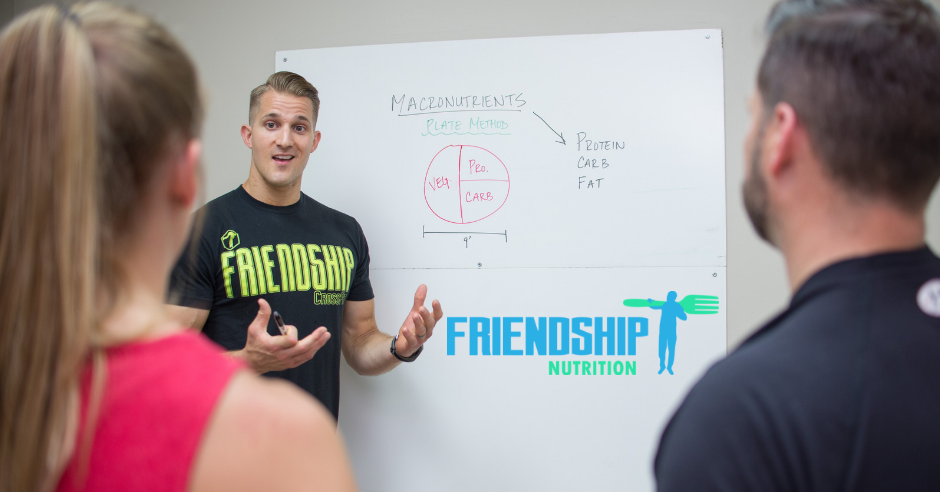Dietitians vs. Nutritionists: What's the Difference?
Dietitian…Nutritionist…Tomato…Tom-ah-to…right?Not exactly. People tend to use these titles interchangeably but, frankly, it’s like calling a pony a zebra. We might be related, but dietitians have distinguishing marks (of expertise) that make us unmistakably different. Full disclosure, I am the resident Registered Dietitian (RD) at Friendship Fitness in Columbus, Ohio. So yeah, I’m a little bias when it comes to this debate. But the point of this article isn’t to put me on a pedestal or knock the nutritionist profession; many of these pros rightfully earned their place at the food counseling table. The point is to help you understand the crucial differences between these two professionals and — most importantly — to bring awareness to a serious detail that sets a registered dietitian apart from a nutritionist; one that particularly affects people who are high risk for or currently struggle with chronic medical conditions. Let’s get to it!
Registered Dietitian (RD)
A credentialed expert on diet and nutrition with the legal capacity to treat specific medical conditions.
- A registered dietitian is formally educated, trained, and licensed to safely and legally prescribe nutritional changes to treat specific health conditions. This is the big difference, folks! Only RD’s and Medical Doctors (MD’s) can do this!
- Dietitians also have specialized training in proven behavioral change techniques and counseling methods that enable us to tailor and administer incredibly effective, life-changing care.
- The advice a dietitian gives is backed by scientific evidence and years of first-hand experience.
- We underwent a lot of schooling, passed the grueling RD Exam, and were awarded our title by the Commission on Dietetic Registration via the Academy of Nutrition and Dietetics.
- Our credentials didn’t come easily. We also put in thousands of hours of supervised and independent practice in hospitals and community settings to “earn our stripes”, and we had to apply for licensure through the state’s medical board (in my case, the State Medical Board of Ohio).
- Like a physician’s creed, we made a promise to uphold specific ethical standards, and we have state and federal agencies that hold us accountable for that promise.
Nutritionist
A person who studies nutrition and provides nutritional guidance and education.
- Nutritionists are less governed by regulations. In the majority of US states, anyone can call themselves a nutritionist without any education or experience. None. Nil. Nada. Click here to see for yourself.
- Luckily, Ohio is one of the states that require formal education, training, and certification to practice nutritional counseling.
- Without RD credentials, a nutritionist cannot legally provide diet or nutritional guidance to treat specific health conditions; their professional capacity is limited to general education and guidance.
If you seek help from a nutritionist in one of the 31 under-regulated states, the advice you get might be safe and accurate. It might also be based on a coach’s personal theories, the latest food or diet trends, or a random Buzzfeed article proclaiming absolute truth based on a single study. These sources aren’t exactly reliable or proven. Why roll the dice when it comes to your health?
Dietitians & Chronic Disease Management
The National Health Council, estimates that about 40% of the U.S. population (and growing) lives with at least one chronic disease. Poor nutrition and physical inactivity (among other factors) are largely to blame for every single one of the leading chronic health conditions, including:
- Heart Disease
- Obesity
- Cancer
- Osteoporosis
- Diabetes
How can you protect yourself? By using nutritional coaching to learn how to live a preventative lifestyle or manage health conditions. This is what Friendship Fitness and our nutrition team are all about! A dietitian can’t prescribe medication to treat health conditions, but we can prescribe nutritional and behavioral changes to reduce your risk, manage symptoms, and — in some cases — eliminate the need for certain medications.
The difference is in the Friendship…
If you are a member of Friendship Fitness, you already know, we aren’t like other wellness programs. Our approach is just as our name suggests — like a friendship. We invest in you and spend time getting to know you before we develop a plan that fits where you are right now and aligns with where you want to be. We don’t encourage “dieting”, implement strict rules, or advocate for the elimination of entire food groups. We teach you about whole, nutritious foods, how to assess ingredient labels, and how to achieve a balanced daily diet that supports your health, weight loss, or fitness goals — for life. It’s like the old adage; give a man a fish, and you feed him for a day. Teach a man to fish, and you feed him for a lifetime. The end goal is to provide you with all the skills and knowledge you need to do this on your own. Along the way, we will:
- Set SMART goals and work around your unique needs.
- Explore the scientific connection between diet, fitness, mental health, and overall wellbeing.
- Identify the triggers or roadblocks that prevent you from making progress.
- Learn how to make lasting behavioral changes to overcome these roadblocks.
Best of all — we WILL achieve your goals! If you are ready to make dietary changes to manage chronic health conditions, live a preventative lifestyle, fuel your passion for CrossFit, up your fitness game, or simply to become the best possible version of yourself — I’m here to take that journey with you. Click here to learn more about our science-based Nutrition Program.Ready to make a move? Schedule a free consultation!Written by Andrew Arra, RD, head of the Friendship Nutrition team!

